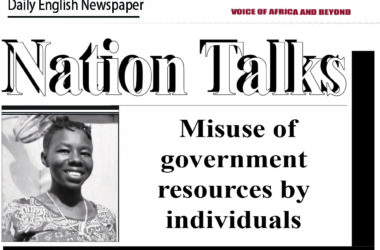By Makak Gile,
Padua, Italy
In what circumstances do people value music’s relevance in their daily lives? Generally, music is defined by scholars as the “art of arranging sound” to produce some combination of form, harmony, melody, and rhythm. Exact definitions of music vary greatly around the world, despite the fact that it is an aspect of all human societies and a cultural universal. A song, on the other hand, is a musical composition meant to be performed with the human voice. This is frequently done at distinct and fixed pitches or melodies, using sound and silence patterns.
Furthermore, music is considered essential for health in the world of mental well-being, where the health of minds is equally recognized. It has long been known to positively affect one’s emotions. According to experts, listening to music you enjoy “helps reduce heart rate, blood pressure, and cortisol in the body.” This is also true in specific societies, such as the one we live in. Importantly, songs sung in a language one understands, phrase by phrase, can help heal emotions. The only “language one understands” that I refer to is what a song’s lyrics are about, regardless of the tune of the voice.
I began listening to songs for quite some time. But I have been observing for moral and spiritual reasons. There had never been a personal anxiety that had to be resolved through music. Until recently, I found that listening to music was worthwhile to incorporate into one’s daily habits. Some songs play specific therapeutic roles that medicine cannot. At a personal level, this discovery occurred over the past two years during the COVID-19 emergency.
Honestly, the stresses caused by the nature of classes; paperwork, anxiety and examination fever, being away from family, and during restrictive COVID-19 safety concerns, have been so disheartening. It was impossible to find a stress-free way of life since there wasn’t enough leisure time.
To cope with the experience, I and two friends had to think about various coping strategies. We all agreed on jogging, mountaineering, and riding bikes every weekend on a specific day. We did try these, and while they did help, I still felt uneasy and tired after each exercise. Imagine a “Junubi” boy with less experience of Western lifestyles.
Someday, a friend suggested drinking coffee, “three bottles of beer a week,” or smoking cigarettes. Despite what some young people are doing, I have hesitated to use wine and cigarettes as a coping strategy. At the same time, I am a non-smoker. “I have hesitated not because they are flawed stress copy strategies, but because I was raised on other assumptions,” I reasoned. In addition, I said, “the mind in this competitive study does not require drugs.” My friends laughed. But I explained to them the importance of “tea and coffee” to any Junubi.
On other days, we consult Google which helps us discover the opinions of psychology and social work experts. According to experts, there are various types of stress management techniques. This includes listening to music. Listening to music became a booming copying strategy that we quickly adopted.
We decided, as a more efficient means, to set aside an hour every Saturday, from 17:30 pm to 18:30 pm, to listen to music, particularly spiritual music. This is to ease our anxiety and stress caused by daily study activities. We can do this both outside and inside our rooms. Each person is alone. In essence, what one listens to is determined by the topics one desires. Spiritual and social songs are both beneficial.
I don’t often use western songs or other African music due to the lyrics’ content. In my opinion, I just need some therapy, perhaps with some social egos since I enjoy listening to traditional songs such as those from “Guandit Bangich Reat, Rial Bany, Emmanuel Kembe, Emmanuel Lasu, Nyankol Mathiang, Vivian Nyachen, John Kodusy, Kang JJ, Gordon Koang, and others” in order to be reminded of Junub’s traditions.
I was fortunate to have access to modern gospel songs on YouTube, and a Nuer Christian hymn book nearby. I was glad to be soothed by songs by my Christian brothers and sisters. Likewise, Mary Betula and Lady Amina, emphasize more peaceful manners as “Rabuna” wishes. Similarly, the modern”Nuer Gospel Singers” such as Emmanuel Otay, Bol Ter, Sister Nyeduol Chol, plus others.
Pieces of music create energy and resilience throughout. Spirits are lifted, bonds are formed, and old memories are brought back. Some songs could make you feel both sad and happy, jubilant, pleading, and calm. Some songs make you want to get up and dance or rather sit alone and reflect. After that, it was easy to rejoice and exclaim, “What a gorgeous song! Eeh”. To wine lovers, a good song feels more than just a “nerve-touching taste” of whisky.
Furthermore, there is an understanding that music’s critical role in modern society has a significant impact on prospects. These roles are ever-evolving, despite singers’ limited resources. According to my personal observations, the music industry in our country survives on the efforts of singers, with limited or without government grants. What do you think if all singers have enough resources for their work?
In conclusion, songs, regardless of their genre, are significant in our daily lives and vital tools for promoting health, peace, and societal prosperity. There is no doubt that some sectional songs may be divisive. However, a song composed with intense elements of nationalism, social values, and dignity, on the other hand, can not only promote peace of mind but also unite society. This brings peace to communities. Apart from temporary stresses brought about by daily up and down, the entire society is traumatized as a result of wars, social grievances, poverty, and climate change.
While music can be a powerful tool for well-being, we need to consider its values as well as its potential to transform lives within communities. Notwithstanding the underestimation of these influences in their roles, which has resulted in the music industry being the most neglected in every institutional budgeting, I would like to take this opportunity to urge churches and other concerned institutions such as those working in culture, tourism, peace, trauma healing, heritage, sports, or others to consider allocating supportive resources to the music industry. Thus, the industry would be able to serve the community more effectively. The initiative would increase productivity as well as provide other opportunities, such as stress management, that public service providers cannot currently offer.
Your brother in Christ.



